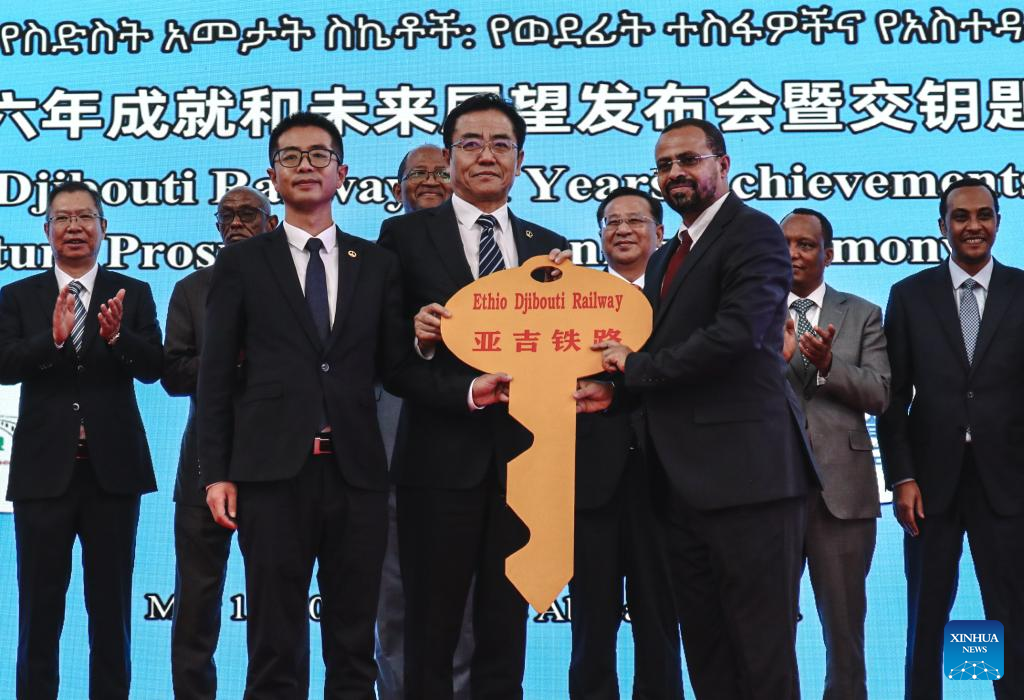
The Chinese management contractors of Ethiopia-Djibouti standard gauge railway on Friday officially handed over the railway’s management and operation to Ethiopia and Djibouti after six years of successful operation.
This came as senior Ethiopian and Djiboutian government officials, the Chinese diplomatic community in Ethiopia, and management contractor of the 752-km electrified transnational railway celebrated the historic milestone of “Turnkey Ceremony” at the Lebu Railway Station on the outskirts of Addis Ababa, the Ethiopian capital, on Friday.
Ethiopia’s Minister of Transport and Logistics Alemu Sime said on the occasion that the railway, since it started operation back in January 2018, has been serving as a critical infrastructure, fostering connectivity between the two Horn of African nations.
“Its establishment stands as a testament to the collaborative spirit and shared pursuit of progress between the two countries. The successful completion and operation of the Addis Ababa-Djibouti railway has significantly enhanced trade and fostered closer ties between the two nations,” Sime said.
He said the vital railway infrastructure has facilitated efficient transportation of goods under the Chinese management contractor, resulting in reduced costs and opening up new avenues for economic growth and development in both countries.
Abdi Zenebe, the chief executive officer of the Ethio-Djibouti Railway Share Company (EDR), said the railway, as one manifestation of the China-proposed Belt and Road Initiative (BRI), is a mutually beneficial cooperation platform advancing socioeconomic development across the two connected countries.
“Six years ago, we embarked on a journey that would connect our two great nations, Ethiopia and Djibouti. EDR was born out of a vision for progress, prosperity, and regional integration. Today, as we celebrate the successful operation and maintenance of this railway, we reflect on the remarkable achievements that have brought us here,” he said.
He further reaffirmed the EDR’s continued efforts to enhance its capacity building program to emerge as a center of excellence that will nurture talent, enhance skills, and empower its workforce.
Djibouti’s Minister of Infrastructure and Equipment Hassan Houmed, on his part, commended the railway’s role in terms of reducing transport time and cost, as well as its contribution in employment creation.
He said the railway’s fast and streamlined transport system has enabled the port nation of Djibouti with infrastructures to decongest its port, promote the comfort and safety of passengers without forgetting its commendable role in terms of environmental protection.
Data from the Chinese management contractor show that the railway has operated over 2,500 passenger trains with a passenger volume of 680,000 in six years; it has operated over 7,700 freight trains, with cargo volume of 9.5 million tonnes in the same period.
The electrified railway has cut the transportation time for freight goods between Ethiopia and Djibouti from more than three days to less than 20 hours, and reduced the cost by at least one-third.
At the same time, the railway has created a large number of local employment opportunities and has fully localized its workforce, employing more than 3,000 local staff.
“The Chinese team is making every effort to promote capacity building. A total of 2,840 people have been trained and certified, realizing the localization of all professions of the railway in the field of operation, maintenance and safety management,” said Guo Chongfeng, chief executive of China Civil Engineering Construction Corporation Ethiopian branch, which constructed this railway and maintained it with another company, China Railway Engineering Corporation.
Guo said the management contractor, by focusing on the future development of the railway, has arranged leadership training for around 200 middle and senior management personnel, and further trained some 100 local managers in China.
Ethiopia, as a land-locked country in the Horn of Africa, accesses international maritime trade through ports in neighboring countries. The Ethiopia-Djibouti trade corridor is the main gateway for Ethiopia, with about 90 percent of its import and export passing through it.
Source: Xinhua


Leave a Reply